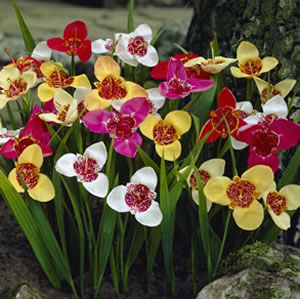Tigridia Growing Guide

What is Tigridia?
Tigridia (Tigridia pavonia) also known as Jockey’s Cap Lily, Peacock Flower, Tiger Flower, Mexican Shell flower is a herbaceous bulbous perennial. It is part of the Iridaceae family or iris family and comes from Mexico. The bulb produces foliage that is ribbed and blade in shape and bright green in colour. During Summer is the flowering period. Each bulb will produce multiple flower spikes and on each spike will produce several flowers. The flower colours come in 2 tone and can be red, pink, yellow, white or orange with a speckled center. Tigridia’s beautiful blooms only last for just a single day however they will continuously bloom throughout Summer. When planting place them in a full sun position with well draining soil. They are both frost and drought tolerant however should be sheltered from the strong winds.
Benefits of Growing Tigridia
Tigridia are great when planted in garden beds, boarders and pots. Their flower display will not go unnoticed. The bulbs multiply quickly and can double/triple each year.
How to Grow Tigridia
Climatic Zones
Cool to Sub-Tropical
Plant Size
Height: 40cm, Width: 10cm
When To Plant Tigridia
Plant in Autumn to Winter.
Soil Preparation
They are not too fussed on soil quality however they do require well draining soil.
How To Plant Tigridia
Plant in full sun, 7-12cm apart with the bulb at a depth of 7cm underneath the soil level.
Tigridia Plant Care
Water well after planting, then only as the ground dries. Do not over water.
Once the leaves are 10cm – 15cm high, a light dressing of all-purpose fertiliser is beneficial.
Cut back when the foliage turns yellow as the plant begins to go into dormancy. Lifting is not necessary as plants prefer to be left undisturbed. Only lift if plants become too crowded.
Watch out for snails and slugs.







